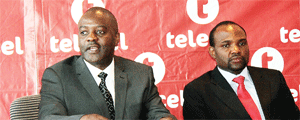
Zimbabwe’s second largest mobile phone operator by subscription, Telecel, yesterday said it was considering listing on the Zimbabwe Stock Exchange (ZSE) as the company seeks capital to embark on a massive network expansion.
Report by Bernard Mpofu Chief Business Reporter Newly appointed chief executive officer Francis Mawindi said Telecel was planning to roll out 200 new base stations across the country by year end, bringing the total number to 576.
He added that the telecoms company was seeking to increase its coverage to 85%, before increasing to 90%, in a development that would require a huge capital outlay.
“Listing on the stock exchange is one of the options that we are considering as a company,” Mawindi told journalists in the capital.
“That is one of the options that is available to us, but off course there will be various other models in terms of capitalisation as a company . . . It is one of the options we are actively pursuing.”
Should shareholders approve, Telecel would become the second telecoms company after Econet to trade on the local bourse.
Mawindi, however, declined to give details on the ongoing shareholder disputes although he said progress was being made to deal with the issue.
- Chamisa under fire over US$120K donation
- Mavhunga puts DeMbare into Chibuku quarterfinals
- Pension funds bet on Cabora Bassa oilfields
- Councils defy govt fire tender directive
Keep Reading
Early this year Telecel came under fire after a parliamentary portfolio committee grilled the company for its slow pace in regularising its shareholding structure, which is heavily skewed in favour of foreigners.
The telecoms firm is 60% owned by Telecel International, while the Empowerment Corporation — a local consortium of individuals and groups — owns 40%.
The country’s equity laws compel foreign-owned companies to dispose of 51% shareholding to locals.
Mawindi said Telecel, whose subscriber base stood at 2,2 million as at August, was targeting 2,67 million users as it seeks to consolidate its position in the highly competitive telecoms sector.
Telecel intends to have at least 18 retail outlets countrywide by the end of the year.
It currently has 12 and has plans for a further 20 shops, which will be added on an identified needs basis across the country.
“Telecel hopes to share passive infrastructure on a reciprocal basis with other mobile network operators and telecommunications service providers, as encouraged by the Posts and Telecommunications Regulatory Authority of Zimbabwe,” he said.
Mawindi said the company planned to open a new third generation technology call centre that would have an interactive voice response facility as well as the capacity to deal quickly with customer queries. This, he said, would complement new value added services that the company intends to roll out.
Telecel communication and branding director Obert Mandimika said revenue generated to data services had, as of April this year, outpaced the short messaging service.
He said data services had contributed 4,2% of the company’s turnover although he did not disclose figures.
Telecel, once the third largest operator after Econet and state-owned NetOne, had in recent times launched several promotions in a bid to grow and consolidate its market share.







